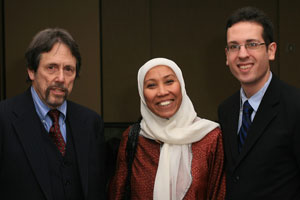
Professor Charles L. Cohen, LISAR’s Graduate Fellow Rohany Nayan and former Student Fellow Simon Dick spoke at a reception with UW-Madison alumni and friends of the Institute after Cohen’s lecture.
Professor Charles L. Cohen, director of the Lubar Institute for the Study of the Abrahamic Religions (LISAR) at the University of Wisconsin-Madison, lectured on “Jews and Muslims in Christian America” at the Mid-Manhattan Branch of New York Public Library before a standing-room crowd on January 20.
His talk was part of the New York Public Library’s “Three Faiths: Judaism, Christianity, Islam” exhibit and series of lectures and programs, which began in October and runs through February.
Cohen, professor of history and religious studies, used an analogy from a fairy tale to frame what “Christian America” means.
“Sorting through the different understandings of the term ‘Christian America’ makes one feel like Goldilocks,” he said. “Papa Bear’s position is that the United States has a special relationship with the Christian God, and that the Bible and Christian values ground our political institutions. This claim is too strong.
“Mama Bear’s position is that the United States is a Christian nation because the majority of the population count themselves Christian. This claim is too weak,” he continued. “Baby Bear’s position is that the constitutional formulas that establish our polity are secular, but they are ensconced in a vibrant religious culture originally constructed centuries ago by a Protestant majority. This claim is just right.”
Cohen addressed the ways that Jews and Muslims accommodate themselves to find their place in that society.
“Jews have had to adapt their religious understandings of space, time, food and the state to the religious ground rules of American culture, and they have been largely successful in doing so,” he said. “Muslims are in the midst of this process, but the rise of radical Islam and the attacks of 9-11 have forced them to explain their religious customs in ways that Jews did not need to address.
“Though Jews have found a home in America, and Muslims most certainly will, they both are keenly aware of where they live: the buses don’t stop on Saturday, the muezzin’s call does not pierce the soundscape five times a day, and even the doors—some of them, at least—are designed to be Christian,” he concluded.
After his lecture, Cohen, LISAR’s Graduate Fellow Rohany Nayan and former Student Fellow Simon Dick spoke at a reception with UW-Madison alumni and friends of the Institute.
In conjunction with the exhibition, the New York Public Library is running a series of conversations, supported by LISAR, called “The 411 on Faith: Communities in Dialogue.”
